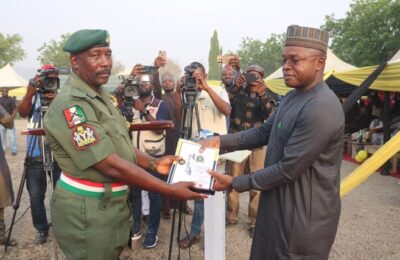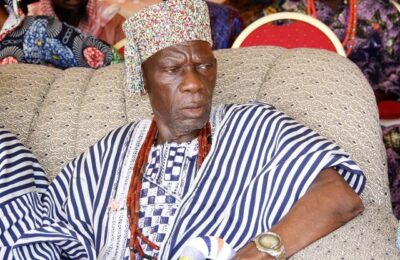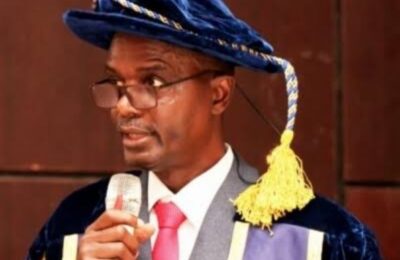Okun, a Yoruba ethnic group in Kogi State, has been agitating for its return into the Southwest. At a meeting in Kabba recently, the group resolved to pursue the demand at the national conference.
The Okun Development Association (ODA), an umbrella socio-cultural and development organisation of the Okun Yoruba people of Kogi State, has called for a boundar adjustment to enable the Yoruba in the Northcentral state to return to the Southwest.
At a meeting in Kabba, the association said that it would pursue this legitimate demand at the national conference.
In a communique, the group said: “The experiences from cultural, economic, administrative and geo-political miniaturization of power and politics, which adversely impact the parasitic nature of Okun people, particularly in Kogi State of North-Central Zone, after the collapse of the Northern Nigeria government, have shown glaringly the irreconcilable contradictions and barriers to Okun people’s security and development aspiration.”
The communique, which was signed by its leader, ambassador babatunde Fadumiyo, reads: “That the National Conference is a welcome open door to canvass and advocate a redress for multiple injustices that have arisen from the mal-location of Okun people since the “mistake of 1914.”
“Since the collapse of the Northern Nigerian Government in 1966, which Okun people contributed immensely to build and nurture hitherto, the cultural, economic and political fortunes of Okun people have been falling and getting near oblivion in Kogi State amidst intensive parochialism and nepotism.
“The various protests, appeals and advocacy for fairness, equity and justice since the times of constitutional conferences in London in 1959 and before several panels on creation of states and boundaries re-adjustment hitherto, have never yielded acceptable attention, as the people have never been allowed to determine “where” and “who” should rule or oversight her security, livelihood, self-esteem and advancement in a free country, Nigeria.
“The heat on the political life of Okun people is approaching a combustive point, hence every lawful pressure must be put in motion to diffuse the tension and set the people free from the sideline of public life, particularly enabling the youth, women and children to have hope and pride to be a Nigerian.
“That the Okun people in Kogi State support totally, the position of the southwest leadership to politically re-unite their kith and kin in Kogi and Kwara States since the neo-colonial boundaries imposed since 1914 remains artificial, except in politics”.
The stakeholders also passed the following resolutuions at the meeting:
“That we, the Okun people in Kogi State and in the Diaspora repose confidence in all Okun Yoruba persons that have been appointed to participate at the National Conference irrespective of the different channels of their appointments.
“The Okun people reaffirm her Yoruba culture, values and territory, which are congruent with the Southwest of Nigeria and without any natural or ecological barrier.
“We, therefore, request as a matter of core demand, the readjustment or re-location of Okun people’s political boundary in Nigeria from the North-Central zone to the Southwest zone of Nigeria.
“The Okun people support and are committed to the principles of federalism, whereby Nigeria adopts a federation of six regions and a federal centre, both tiers working as coordinate rather than subordinate structures, and in accordance with their separate constitutions.
“Each region should consist agreed number of states based on political peculiarities, and each state be divided into Local Government Areas; while each Local Government Area is broken into Districts or Development Areas.
“The Okun people of Kogi State should be carved out as a new state, Okun State in the Southwest region, based on her enormous economic potentials and the 100 years of harrowing political experiences.
‘In enhancing No. 6 above, the Okun people do not object to cooperation and/or relationship with any group of people that share a similar aspiration and willingness to realign with this core interest and demand.
“Owing to the vastness of each Local Government Area in Okun territory, more Local Government Areas, Districts and Development Areas should be created along with the new state structure to enhance effective participatory democracy and good governance from below.
“We recommend amendments to Sections 7 (1) and 162 (6) and (8) of the 1999 Constitution as amended, to properly establish the Local Government system as an autonomous fourth-tier of government in the new Nigeria but second-tier in each of the new state in the new Region; and to replace the archaic functions with responsive responsibilities that are relevant to contemporary development environment; and also remove the Ministry of Local Government and Chieftaincy Affairs and the Local Government Commission and transfer their administrative functions to each of the new Local Government.
“A formal referral council should be created to enable the leadership of traditional institution participate on specific matters that promote culture and tradition, energize domestic security, promote peace and harmony and oversight local development resources and project.
“Specific and clear constitutional clause(s) should be made to enforce power rotation – of the executive power seat – among the component parts of the federal, Regional, State and Local Government Areas, to forestall objectionable domination by a particular group of persons or interests.
“The revenue sharing formula for the Federation Account should be adjusted as follows: Derivation- 20 per cent; Federal Government – 25 per cent; Federating Units/Regions – 30 per cent; Local Government – 20 per cent; and Other funds – 5 per cent.
“The pursuit of justice demands unhindered access to the instruments of justice – the courts. Therefore, every litigant should have access to the highest hierarchy of the judicial system in the pursuit of justice without impediment. The restriction of litigation to only the Court of Appeal especially on election matters is an inhibition of freedom and liberty; hence it should be removed; while each region may have her own supreme court and each state to have a Court of Appeal.




